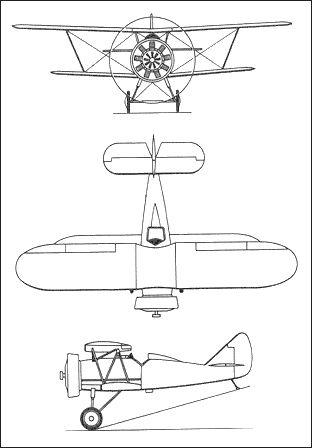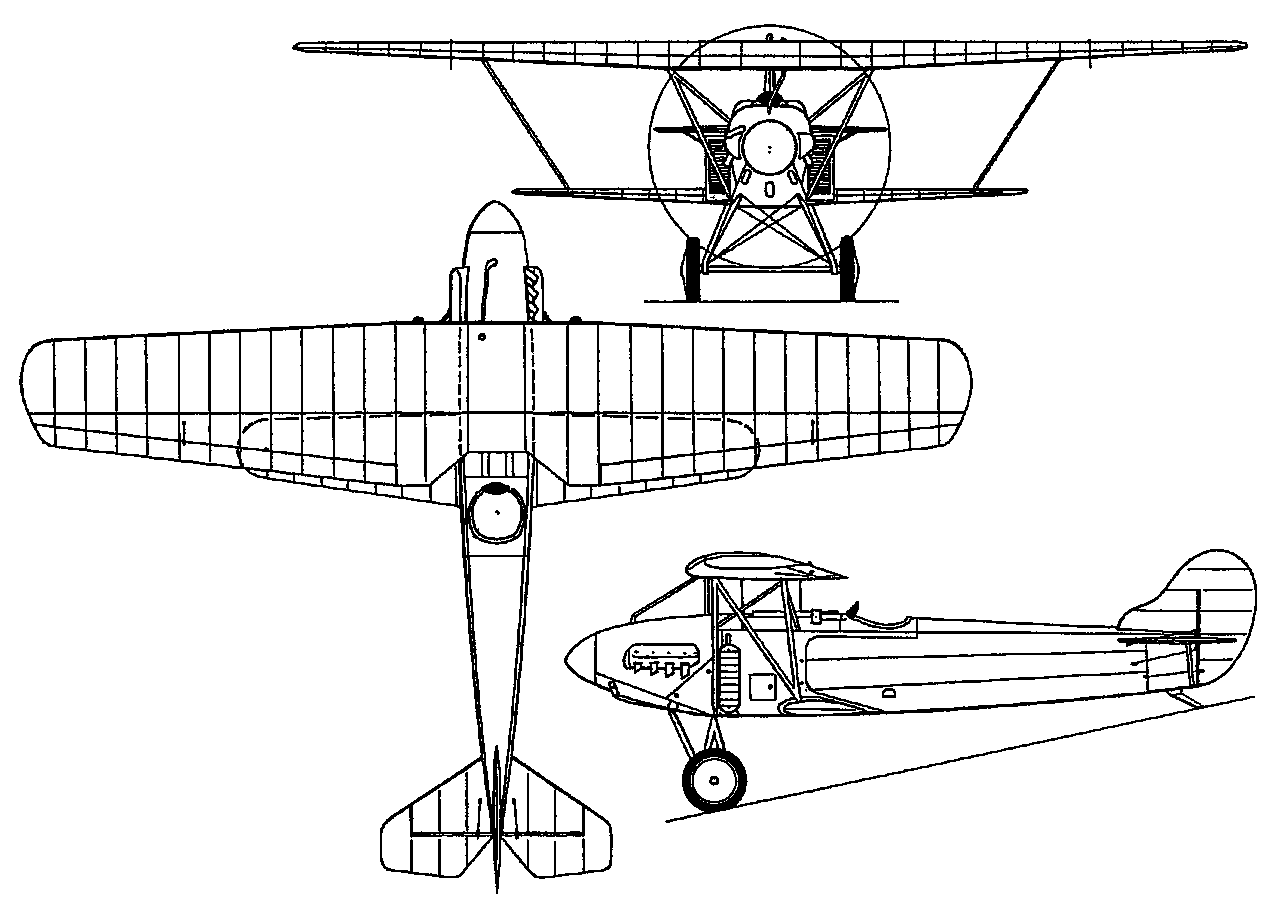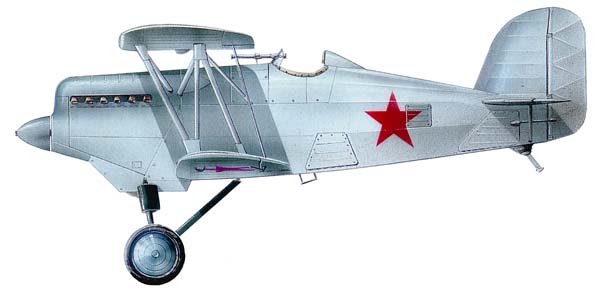Okay, here comes a lot of info...
1. Polikarpov I-5


Strangely, this is a plane that actually served in World War II as a ground attack aircraft until 1942. It was literally already phased out of use and brought back as something of a desperation measure. It was introduced in 1931 making it a contemporary of the Polikarpov R-5 for most of its service life. Like many of the interwar planes you can see a great deal of design elements of World War I planes in it's overall shape and appearance. It was armed with two PV-1 machine guns and up to two FAB-10 bombs.
A quick look on wikipedia says that it was used by the following units during 1941 and early 1942: 605th IAP, 606th IAP, 2nd ShAP, and 11th ShAP. At least 65 were in use with the ShAPs, and an unknown number with the IAP. All I-5s were withdrawn by February of 1942 when production of more advanced craft caught up with the needs of the front. In the 2nd and 11th ShAP it was replaced by the IL-2.
VariantsThe only major variants of the I-5 were a version involved in tests of the Zveno project where a Tupolev TB-3 heavy bomber carried three I-5s as parasite fighters and the I-5UTI two-seater conversion used for training.
I-5, 1931
Main production model: powered by a 480 hp (358 kw) Shvestov M-22 Radial Engine, ~800 produced.
I-5UTI, 1931
Trainer: features two cockpits, powered by a 480 hp (358 kw) Shvestov M-22 Radial Engine, ~20 produced.SpecificationsCrew: 1
Length: 6.78 m (22 ft 3 in)
Upper wingspan: 10.24 m (33 ft 7 in)
Lower wingspan: 7.4 m (24 ft 3 in)
Wing area: 21.3 m2 (229 sq ft)
Airfoil: Go"ttingen-436
Empty weight: 934 kg (2,059 lb)
Gross weight: 1,355 kg (2,987 lb)
Fuel capacity: 165
Powerplant: 1x Shvetsov M-22 9-cylinder, single-row radial engine, 358 kW (480 hp)
Propellers: 2-bladed duralumin, 2.7 m (8 ft 10 in) diameter
Maximum speed: 278 km/h (173 mph; 150 kn) at sea level
Range: 660 km (410 mi; 356 nmi)
Service ceiling: 7,500 m (24,606 ft)
Time to altitude: 1.6 minutes to 1,000 metres (3,300 ft)
Horizontal turn time: 10 sec
Guns: 2x 7.62-mm PV-1 machine guns
Bombs: 2x 22-lb (10-kg) likely the same bombs as used by the R-5.2. Fokker D.XIII


Covertly chosen by the Reichswehr for their secret air force, the Fokker D.XIII is an obvious evolution of the older Fokker series. Like its predecessors it features a pair of LMG 08/15 'Spandau' machine guns. The plane was first flown in 1924 and was procured by German officials for their secret air force. 53 were produced, with most of them being transferred to Russian hands in 1933.
VariantsOnly one major variant was produced, the main production model.
Fokker D.XIII, 1925
Main production model: powered by a 570 hp (425 kw) Napier Lion XI W12 In-Line Engine, 53 produced.SpecificationsCrew: 1
Length: 7.90 m (25 ft 11 in)
Wingspan: 11.00 m (36 ft 1 in)
Height: 2.90 m (9 ft 6 in)
Wing area: 21.5 m2 (231 ft2)
Empty weight: 1,220 kg (2,690 lb)
Gross weight: 1,650 kg (3,640 lb)
Powerplant: 1x Napier Lion XI, 425 kW (570 hp)
Maximum speed: 270 km/h (170 mph)
Range: 600 km (380 miles)
Service ceiling: 8,000 m (26,250 ft)
Rate of climb: 9.8 m/s (1,930 ft/min)
Guns: 2x fixed, forward-firing 7.92 mm (.312 in) LMG 08/15 "Spandau" machine guns in forward fuselage3. Tupolev R-6


Another interesting plane from the Russians. The Tupolev R-6 aka ANT-7 is a interesting plane which served in a myriad of roles from reconnaissance and light bomber to maritime patrols as a floatplane. It saw service in the Winter War and may have been in limited use during the early months of the Great Patriotic war. Armament varies a bit depending on the role, but each has at least one PV-2 machine gun as an absolute minimum. 411 were produced from 1931 to 1934.
VariantsMany variants of the R-6 Tupolev were produced, for multiple different roles including torpedo bombers, escort fighters, floatplanes, cargo planes, and passenger aircraft.
ANT-7, 1923
The OKB designation of the project and prototype, powered by two 544.4 kW (730 hp) BMW VI V-12 engines.
R-6, 1931
(R - Razvyedchik - reconnaissnace) reconnaissance version, powered by two 544.4 kW (730 hp) Mikulin M-17F V-12 engines. first flight 1929, trials 1930.
KR-6, 1934
(KR - Kreiser Razvyedchik - cruiser reconnaissnace) escort fighter version, powered by two 507.1 kW (680 hp) Mikulin M-17 V-12 engines, fitted with two PV-2 machine guns and a second gunner.
KR-6P, 1934
Alternative designation of the MR-6 floatplane version.
MP-6'2M-17, 1934
(Morskoj Paassazhirskii - maritime reconnaissance)Civil floatplane version, powered by two 507.1 kW (680 hp) Mikulin M-17 V-12 engines.
MR-6, 1932
(Morskoj razvyedchik - maritime reconnaissance) R-6, torpedo bomber version.
PS-72M17, 1934
(Paassazhirskii - passenger transport) Civil transport version PS-7 2M-17, cargo and passenger transport, first versions open cockpit, one version enclosed.
P-6, 1934
(Paassazhirskii - passenger transport) Civil cargo and passenger transport version.
R-6 Limuzin, 1933
Nine seat civil transport version with a closed cockpit and a seven-seat cabin with glass windows and also a luggage compartment. Powered by two 544.4 kW (730 hp) BMW VI V-12 engines. First flown in July 1933 the sole R-6L crashed on 5 September 1933 as a result of a maintenance error.SpecificationsCrew: 4
Length: 15.06 m (49 ft 5 in)
Wingspan: 23.2 m (76 ft 1 in)
Wing area: 80 m2 (860 sq ft)
Empty weight: 3,856 kg (8,501 lb)
Gross weight: 6,472 kg (14,268 lb)
Powerplant: 2x Mikulin M-17F V-12 water-cooled piston engines, 540 kW (720 hp) each
Maximum speed: 230 km/h (143 mph; 124 kn) at sea level 216 km/h (134 mph) at 3,000 m (9,843 ft)
Range: 800 km (497 mi; 432 nmi)
Service ceiling: 5,620 m (18,438 ft)
Rate of climb: 2.7 m/s (530 ft/min)
Wing loading: 81 kg/m^(2) (17 lb/sq ft)
Power/mass: 0.170 kW/kg (0.10 hp/lb)
Take-off distance: - 160 m (525 ft) / 11 seconds
Landing distance: - 250 m (820 ft) at 110 km/h (68 mph)
Guns: 5x 7.7 mm (0.303 in) calibre PV-2 machine gun
Bombs: 600 kg of bombs.4. Curtiss P-1 Hawk


The Curtiss P-1 Hawk and its derivatives were the workhorse of the American Army Air Corps for much of the 1920s. It's a classic in a lot of ways and very similar to the Word War I type of planes we already have. Each was equipped with two .30 caliber browning machine guns and over 200 were built.
VariantsThere are a vast number of variants to the Curtiss P-1 airframe. While a total of 202 Hawks were built in the basic variants PW-8, P-1, P-2, P-3, P-5, AT-4 and AT-5, conversions resulted in 148 having a P-1 designation.
XPW-8
3 manufactured, one modified to XPW-8A and later XPW-8B standard, one converted to CO-X two-seat observation aircraft.
PW-8
25 produced and flown by 17th Pursuit Squadron.
XPW-8A
An XPW-8 converted with a new cooling system and modified wings for trials.
XPW-8B
Model 34 - The XPW-8A fitted with single-bay tapered wing as prototype for the P-1 series.
P-1
Model 34A - Production version of the XPW-8B with modified rudder and additional wing center strut, and Clark Y aerofoil, powered by 435 hp (324 kW) Curtis V-1150-1 (D12), 10 built.
P-1A
Model 34G - P-1 with 3-inch fuselage stretch, larger wheels and revised fuel system, 25 built with D-12C engine and three conversions from P-2. Final two converted to XAT-4 Trainer and XP-3 racer prototypes. Delivered in 1926.
XP-1A
One P-1A used for development trials.
P-1B
Model 34I - 25 produced with Curtis V-1150-3 (D-12D) engine. Increased weight reduced performance. Delivered 1927.
P-1C
Model 34O - 33 built with Curtis V-1150-5 (D-12E) engine. Increased weight further decreased performance. delivered 1927-28.
XP-1C
One P-1C fitted with a revised radiator.
P-1D
24 conversions from AT-4 trainers, re-engined with Curtis V-1150-3 (D-12D) engines.
P-1E
4 conversion from AT-5 trainers re-engined with 440 hp (328 kW) V-1150-3 built as AT-4s and converted to XAT-5 prototype. All re-engined and converted to P-1E.
P-1F
24 conversions from AT-5A trainers, one conversion from XP-21A, all re-engined with a 440 hp (328 kW) Curtis V-1150-3 in 1929.
P-2
Model 34B - P-1 with a 500 hp (373 kW) Curtiss V-1400, five built. 3 later converted to P-1A and one re-engined with the Curtiss V-1570-1 as the XP-6.
XP-3
Radial-engined version, one converted from a P-1A with 390 hp (291 kW) Curtiss R-1454 engine, later converted to XP-3A.
XP-3A
XP-3 re-engined with a 410 hp (306 kW) Pratt & Whitney R-1340-1
XP-21
XP-3A re-engined with the Pratt & Whitney R-985 Wasp Junior.
P-3A
Model 34N - five production aircraft to the AT-5A design with a 410 hp (306 kW) Pratt & Whitney R-1340-7.
XP-4
P-1A modified with a supercharged 510 hp (380 kW) Packard 1A-1530 engine.
XP-5
P-1A version with a 435 hp (324 kW) Curtiss V-1150-3 engine.
P-5
Model 34L - four built, same as XP-5 later modified with the Curtiss D-12F engine.
XAT-4
Model 34J - P-1A re-engined with a 180 hp (134 kW) Wright-Hispano E as an advanced trainer.
AT-4
Production version of the XAT-4, 40 ordered, first 35 were converted in 1929 to P-1Ds with the Curtiss D-12 engine, and the remainder completed as AT-5s.
AT-5
Model 34J - five aircraft originally to AT-4s re-engined with a 220 hp (164 kW) Wright J-5, later converted to P-1Es.
AT-5A
Model 34M - 31 aircraft based on the P-1B with a lengthened fuselage, later converted to P-1Fs.
CO-X
the first XPW-8 prototype was converted into a two-seat observation aircraft.
All variants increased in weight with each succeeding model, resulting in slight reductions in performance with each.SpecificationsCrew: 1
Length: 23.0 ft (7.01 m)
Wingspan: 31.5 ft (9.6 m)
Height: 8.75 ft (2.67 m)
Wing area: 252 ft^(2) (23.41 m^(2))
Airfoil: Clark Y
Empty weight: 2,195 lb (996 kg)
Max. takeoff weight: 2,937 lb (1,349 kg)
Powerplant: 1x Curtiss V-1150-3 liquid-cooled V12 engine, 435 hp (324 kW)
Maximum speed: 155 mph (249 km/h)
Cruise speed: 123 mph (198 km/h)
Range: 300 mi (483 km)
Service ceiling: 20,800 ft (6,340 m)
Rate of climb: 1,460 ft/min (7.42 m/s)
Guns: 2x .30 in (7.62 mm) fixed forward-firing Browning machine guns.5. Heinkel I-7


The Heinkel HD 37 was a plane originally designed for the secret air force that the Germans were building in the 20s and 30s, but it was rejected by the Germans. Instead the Russians bought the rights to manufacture it and produced more than 134 planes. The Russians also re-designated it the I-7. Each was fitted with two PV-1 machine guns, but was disliked by its pilots. Ultimately the I-5, which the Russians had intended to replace with the I-7 saw service long into the future.
VariantsThe Heinkel I-7 was manufactured in three distinct versions. The first two were the German HD 37 and HD 43 which never went into full scale production. The last was the I-7 which went into large scale production by the USSR.
Heinkel HD 37, 1928
2 prototypes built.
Heinkel HD 43, 1931
Powered by a 750 hp (559 kw) BMW VI V12 engine: 1 built.
I-7, 1931
Production model, powered by a 730 hp (540 kw) Mikulin M-17F engine: 131 built.SpecificationsCrew: 1
Length: 6.95 m (22 ft 10 in)
Wingspan: 10.00 m (32 ft 10 in)
Height: 3.20 m (10 ft 6 in)
Wing area: 25.9 m2 (279 ft2)
Empty weight: 1,419 kg (3,121 lb)
Gross weight: 1,792 kg (3,942 lb)
Powerplant: 1x Mikulin M-17F, 540 kW (730 hp)
Maximum speed: 291 km/h (182 mph)
Range: 700 km (440 miles)
Service ceiling: 7,200 m (23,600 ft)
Rate of climb: 9.7 m/s (1,900 ft/min)
Guns: 2x fixed, forward-firing 7.62 mm (.30 in) PV-1 machine guns.
 Author
Topic: Some interwar craft that would be fun... (Read 7795 times)
Author
Topic: Some interwar craft that would be fun... (Read 7795 times)


